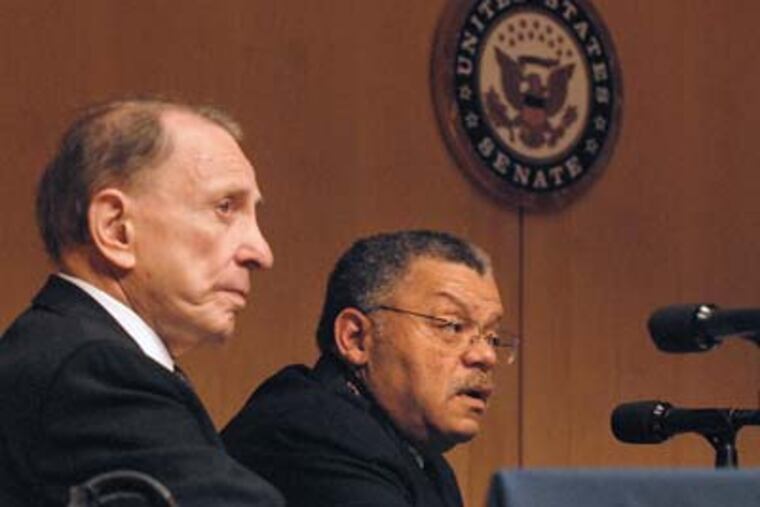Specter: Witness intimidation should be a federal crime
Calling witness intimidation "a gigantic problem" in Philadelphia, U.S. Sen. Arlen Specter said Friday that he would support legislation to make it a federal crime when threats are made in cases prosecuted in local court.

Calling witness intimidation "a gigantic problem" in Philadelphia, U.S. Sen. Arlen Specter said Friday that he would support legislation to make it a federal crime when threats are made in cases prosecuted in local court.
When serious crimes go unpunished because of the loss of a witness, "that's a total breakdown of the rule of law, and it's appropriate for the federal government to come and help out," said Specter, who convened a Senate subcommittee hearing on the subject at the National Constitution Center.
Specter, a Pennsylvania Democrat who is up for reelection this year, called the hearing in response to a series of stories in The Inquirer that highlighted problems in the city's troubled courts.
Later Friday, U.S. Rep. Joe Sestak, who is challenging Specter for the Senate nomination in the Democratic primary, held a competing community forum on the same issues.
Sestak read excerpts from The Inquirer series to the audience and said the findings were disturbing, and the problems, systemic.
"No one is singularly at fault here. We all are," he said. "We have neglected our cities for far too long."
The Inquirer stories documented a criminal justice system in crisis, beset by the nation's lowest felony conviction rate, a massive number of fugitives - and an epidemic of witness intimidation.
At the two sessions, witnesses said problems in the city's criminal justice system were deep-rooted and severe - and would take input from many players to fix.
Robert Welsh, a defense attorney and former federal prosecutor, said defense lawyers, prosecutors and judges would have to find common ground as they search for solutions, perhaps by changing laws or rules of criminal procedure.
"I assure you everybody has the same thing to say about this and that's 'The system is broken,'" he said.
John Goldkamp, a criminologist and professor at Temple University, said the issues highlighted by The Inquirer were "symptoms of dysfunction."
The newspaper reported that criminal cases routinely collapse because of witnesses have been frightened or harmed. Prosecutors, judges and defense attorneys told the newspaper that witness recantations have become the norm in city courtrooms.
"If law enforcement breaks down because of some misguided notion of not being a snitch, something has to do done," Specter said.
He stopped just short of saying flatly that he would introduce a bill to make intimidating witnesses in local court cases a federal crime, but endorsed the idea and said he would talk to his colleagues to line up support.
Specter said the prospect of federal charges would have a strong deterrent effect. He said it would trigger FBI investigations and trials in the tough federal system, where sentences are long and court delays few.
U.S. statutes can "federalize" a crime, provided that there is an link to interstate commerce in the wrongdoing. For example, federal prosecutors pursue bank robbers because banks are tied into the federal monetary system or go after robbers of convenience stores stocked with goods trucked across state lines.
Federal law already forbids the intimidation of witnesses in federal court proceedings - and mandates tough punishment. Prosecutors may seek the death penalty for defendants convicted of killing federal witnesses.
Philadelphia Commissioner Charles H. Ramsey, who spoke at Specter's hearing, agreed that the federal hammer would hit hard.
"I think that would make a tremendous difference and make people think twice before they did it," he said.
Ramsey, like Specter, said criminals were fearful of being charged in federal court, where prosecutors have markedly higher conviction rates. Most cases, however, especially those involving acts of violence, are tried in the local courts.
Other witnesses at the Senate hearing included two people whose tragic stories were highlighted in The Inquirer series.
Ted Canada spoke of how his son, Lamar, 17, was shot to death in 2005, gunned down over a gambling debt. He detailed how one witness in the murder case was killed after he testified at a court hearing, and how another witness disavowed his earlier statement to police because he had been threatened.
In the streets, Canada said, "They have a phrase - snitches get stitches."
Barbara Clowden spoke of the death of her son, Eric Hayes, 16. He was killed in 2006, days before he was to testify as a witness in an attempted arson case.
In other testimony, veteran defense lawyer Michael Coard criticized The Inquirer's articles, calling them "frightfully inflammatory."
Coard said the newspaper, in highlighting the collapse of a majority of violent-crime cases each year, failed to emphasize that defendants were presumed innocent.
He called witness intimidation a problem, but said he did not consider it a "crisis."
Ramsey disagreed and said police officers and prosecutors confront the problem every day.
"It's something that's very, very severe in my opinion," he said.
The police commissioner urged more funding for the city's witness relocation program, which relies on state money and has lost funding in recent years.
Specter said he would urge his colleagues on the Senate to funnel federal money to local programs to protect witnesses.
A measure to provide $30 million a year for five years overwhelmingly passed the U.S. House last year. It is pending in the Senate. Specter supports the measure. Sestak is a co-sponsor.
Friday's hearing was the first public step in an examination of Philadelphia's criminal court system that Specter launched in response to The Inquirer series. He said his next focus would be the city's fugitive problem - 47,000 people are wanted on bench warrants for skipping court.